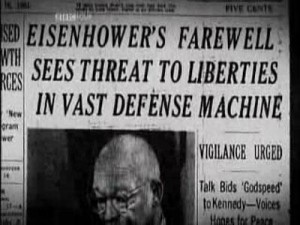
from the Council on Foreign Relations (CFR)
Interviewee: Leslie H. Gelb, President Emeritus, CFR
Interviewer: Bernard Gwertzman, Consulting Editor
January 13, 2011
On Monday, January 17, 1961, President Dwight D. Eisenhower’s farewell address warned the nation to guard against the influence of a rising “military-industrial complex.” That nexus of military, industrial, technological, and congressional interests has expanded considerably since Eisenhower’s cautionary speech, says military affairs analyst Leslie H. Gelb. Secretary of Defense Robert Gates, who has invoked Eisenhower’s warnings in the past year, recently promised $78 billion in cuts over the next several years, but Gelb says it’s unclear whether this will happen and what those cuts will be. Stressing the need for the federal budget to focus more on bolstering the economy–rather than a huge military–Gelb says he would advise President Barack Obama to make a strong case to the public for why the economy and jobs are “essential for the maintenance of democracy, for the maintenance of our economic competitiveness and our schools, and for our military security in the world.”
Wasn’t the military budget at the time of Eisenhower’s speech much less than it is today, in comparable figures?
You’re right, if you do it in constant dollars. Compare how much we are spending on the military Eisenhower’s farewell address, today, which would be about $750 billion a year. If you compare the Eisenhower budget in today’s dollars, it would be a little more than half, or $400 billion. So there is a huge difference, and he went out of his way even then to warn of the growth of the military spending.
What caused Eisenhower, who led the allied troops in Europe during World War II, to be so concerned?. . .Read Complete Report
Go DEEPER: THEI Video 101







Leave a Reply